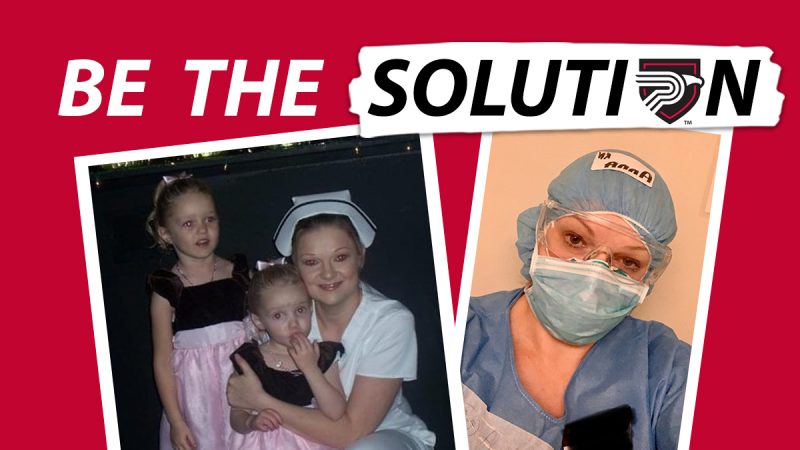Polk State Nursing grad takes skills to NYC to care for COVID-19 patients

It’s the “Wild Wild West” of nursing, Anna Hansel says. It’s the end of week five of 13 she plans to spend on assignment in New York City, where the Polk State College Nursing alum is serving one of many hospitals overrun with COVID-19 patients.
She is exhausted at the end of each 12-hour shift. Her feet never seem to stop hurting and her forehead is marked by the face shield she wears as part of her protective equipment. A good day is when her five unstable and ventilated patients survive on her watch.
“There is not a moment that you are not on your feet and you are always running around,” Hansel explained. “There’s constant beeping that a patient has run out of fluids or needs help. There’s not enough tubing or sanitary wipes. We ran out of body bags.”
“There is no time to wrap your head around what is happening,” she added, “you just have to go and do all you can to keep your patients alive and comfortable.”
The education and training she received in the Polk State Nursing Program, paired with her innate drive to help people in the critical care setting, keep Hansel going.
“Our skills are really being put to the test and the theories that were ingrained in us in school are really coming into play with COVID-19,” said Hansel, who achieved her Polk State Associate in Science in Nursing in 2008. “I always tell people that if you want a quality education, Polk State has the most rigorous Nursing Program and can guarantee that you will go into the field knowing your stuff.”
This is evident by Polk State Nursing graduates’ 100 percent pass rate on the National Council Licensure Examination – Registered Nurse (NCLEX-RN) compared to the 76 percent state pass rate and 89 percent national pass rate in the first quarter of 2020.
Hansel compared Polk State Nursing to boot camp.
“I was active duty in the U.S. Army and went through basic combat training. When I say the training at Polk State is rigorous, I mean it,” Hansel said. “Polk State doesn’t hand anything to you – you have to earn it and you will be a better nurse because of it.”
After two enlistments in the Army, Hansel had her children and sought a career that was more conducive to family life, she shared.
“The rest was history,” she said.
Most recently she has worked with a nursing staffing agency in Lakeland to take assignments on her own schedule in central Florida.
The decision to take an assignment in New York City, where the number of COVID-19 cases is almost 10 times that in Florida, was a no-brainer for Hansel.
“I figured that if I was going to be in the deep of COVID-19, I should go to where there is a shortage of nurses,” she said. “I’m also not going to be exposing my kids.”
Within 24 hours of expressing her interest in an NYC assignment, the agency had placed her with a hospital and she was undergoing a physical and lab work.
By the end of the week, she was on a plane.
Hansel recalled one of her first experiences as a nurse at Lakeland Regional Health to explain what keeps her motivated during her hectic and trying assignment in New York.
“I was active duty in the U.S. Army and went through basic combat training. When I say the training at Polk State is rigorous, I mean it. Polk State doesn’t hand anything to you – you have to earn it and you will be a better nurse because of it.”
“It was the very first code I experienced and it was complete chaos, but the nurses were able to bring the patient back to life,” she said. “It was then that I knew what I wanted to do – I wanted to work in the ICU.”
“I love this type of nursing,” she added about what she is experiencing in NYC through the COVID-19 crisis. “I like the high intensity and the opportunity to save lives.”
Like many nurses, she struggles with the reality that she cannot save every life.
But she added that the foundation she received at Polk State and taking each shift at a time is helping her through.
“All I can do is go in each day with one thing in mind – to keep someone alive on my shift,” Hansel said. “I take it in increments of 12 hours and tell myself that each person that stays alive on my shift is a tiny step in the right direction.”

